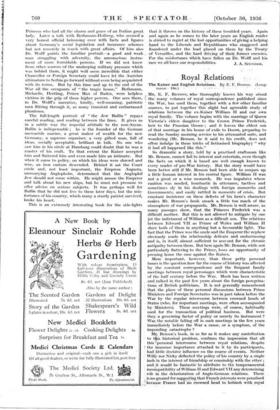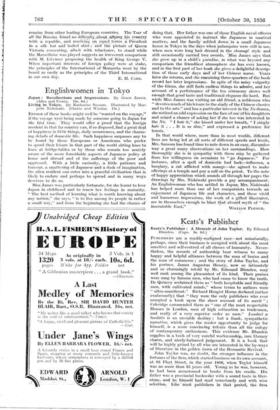The Kaiser and English Relations. By E. F. Benson. (Long-
Royal Relations
manA • 18st) - ' • ••• .
MR, E. F. BENSON, who thoroughly knows his way about the 'many volumes of royal correspondence published since
the War, has used them, together with a few other familiar sources, to put together this slight but agreeable study of relations between the ex-Kaiser William II and our own royal family. The volume begins with the marriage of Queen Victoria's eldest daughter to the Crown Prince Frederick, heir to the Prussian throne ; and it leaves the eldest son of that marriage in his house of exile to Doom, preparing to read the Sunday morning service to his attenuated suite, and wondering (Mr. Benson, be it said to his credit, does not often indulge in these tricks of fictionised biography) " why it had all happened like this."
So dramatic a story, told by a practised craftsman like Mr. Benson, cannot fail to interest and entertain, even though the facts on which it is based are well enough known to every reader of pre-War history. But the story would have been better still if Mr. Benson had been able to conjure up a little human interest in his central figure. William II was not a great or a wise monarch. He was impulsive where caution was needed, bombastic in utterance, tactless and sometimes sly in his dealings with foreign monarchs and . Governments, and easily rattled in moments of crisis. But constant insistence on these defects of his hero's character makes Mr. Benson's book smack a little too much of the atmosphere of war propaganda. Mr. Benson is well aware, as many passages show, that the Princess Frederick was a difficult mother. But this is not allowed to mitigate by one jot the indictment of William as a difficult son. The relations between Edward VII as Prince of Wales and William II shoW both of them in anything but a favourable light. The fact that the Prince was the uncle and the Emperor the nephew obviously made the relationship delicate and embarrassing and is, in itself, almost sufficient to acccunt for the chronic antipathy between them. But here again Mr. Benson, while not
• particularly flattering to the Prince, loses no opportunity of pressing home the case against, the Kaiser.
More important, however, than these petty personal issues is the question how far the course of history was affected by, the constant correspondence and the frequent family meetings between royal personages which were characteristic of the half century before the War. Much has been written and .talked in the past few years about the foreign peregrina- tions of British politicians. It is not generally remembered that the place of these personal dilcussions between Prime Ministers and Foreign Secretaries was in part taken before the War by the regular intercourse betWeen crowned heads of States (who, for important meetings, were often accompanied by, Ministers). These meetings were, of course, habitually used for the transaction of political business. But were they. a governing factor of policy or merely its instrument Was. the notable falling off in such meetings in the few years immediately before the War a cause, or a symptom, of the impending catastrophe
M. Benson's book, in so far as it makes any contribution to tills historical problern, confirms the impression that all this .personal intercourse between royal relations, despite the immense importance attached to it by its participants,
• had little decisive influence on the course of events. Neither Willy nor Nicky deflected the policy of his country by a single inch* the interest of friendship or cousinship with the other ; and it _would- be fantastic to attribute to the temperamental incompatibility of William II and Edward VII any determining ?Ole in .the deterioration of Anglo-German relations. There . is 'no ground for suggesting that French interests were penalised lbecause France had no crowned fiead to hobnob with royal cousins from other leading European countries. The Tsar of all the Russias ftittnd no difficulty, about _wing his eounlry with a republic, and receiving on ,equal terms a President in a silk hat boiled shire; and the picture of Queen Victoria consenting, albeit with reluctance, to stand while the Marseillaise was played suggests an irreverent comparison with M. Litvinov proposing the health of King George V. When important interests of foreign policy were at stake, the principles of the International of Monarchs went by the" board as easily as the principles of the Third International





















































 Previous page
Previous page